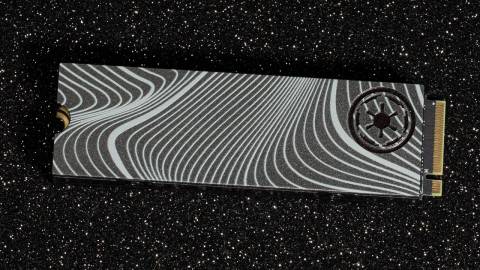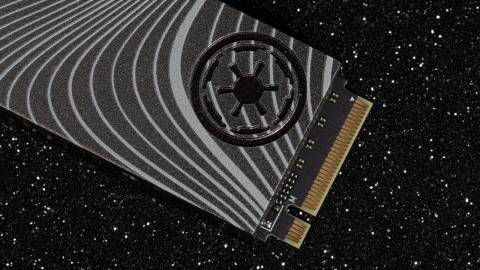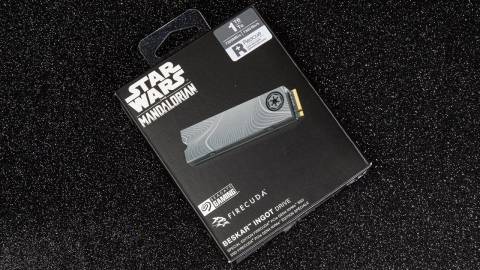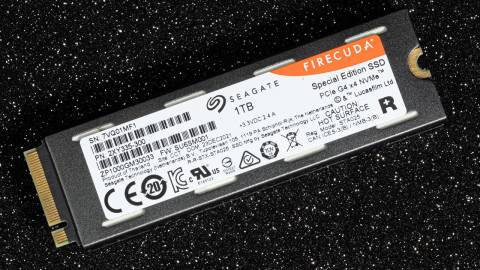Star Wars fans, prepare to collect your bounty. Billed on Seagate's site as the deadliest M.2 SSD in the galaxy, the FireCuda Beskar Ingot PCIe 4 solid-state drive is a special-edition gaming drive modeled on the Seagate FireCuda 530 and decorated to resemble an ingot of Beskar (Mandalorian steel). The Ingot is indeed priced like precious metal, at $272.99 for the 1TB version as tested (or $167.99 for 500GB), and its performance in our benchmark tests proved suitable for high-impact gaming, though its sequential read speed fell short of its rating. Although its design is attractive, unless your PC has a see-through side panel and a clear line of vision to an M.2 slot, you can either use the Beskar Ingot SSD or admire it, but not both.

Star Wars Decor in Your M.2 Slot

When viewed from the top, the Beskar Ingot SSD's heat shield is decorated to look like a chunk of the priceless metal that Mandalorians forge into their impenetrable armor, replete with Imperial stamp.

The drive itself is a four-lane PCI Express 4.0 SSD manufactured on an M.2 Type-2280 (80mm) circuit board. It employs the NVMe 1.4 protocol over the PCIe 4.0 bus and uses 176-layer Micron TLC NAND flash as well as a Phison PS6108 controller. (Check out our glossary of SSD terms if any of this jargon is new to you.)

Although the list prices above indicate a considerable premium for the Beskar Ingot's Star Wars chic, it's not quite as exorbitant in the real world. The 500GB version is currently selling at Amazon and elsewhere for about $120, or 22 cents per gigabyte, while Best Buy is offering the 1TB drive for $180 (18 cents per gig). That is still a bit high, but in the same solar system as like-capacity PCIe 4.0 drives.

Behold the Ingot, or Hide It Away?
As mentioned, a potential drawback of the Beskar Ingot in M.2 form is that it may not be able to do double duty as a collectible and a working SSD. Unless you have a gaming rig with a tempered-glass panel, it's likely to spend its days out of sight in your desktop's innards. If you put it in a PlayStation 5, you may never look at it again.
By contrast, you can show off Seagate's Beskar Ingot External Hard Drive to your heart's content. That device is predictably larger and way slower, but it adds visual flourishes like the Mudhorn Clan insignia and Mandalorian phrase This Is the Way (written in Mandalorian runes, of course), as well as a smidge of RGB lighting. The SSD does come with several sheets of FireCuda stickers in the box, one of them Mandalorian-themed, so you can at least advertise its presence on the outside of your desktop or PS5, if that's your thing.
Seagate backs the Beskar Ingot SSD with a five-year warranty, including three years of access to Rescue Data Recovery Services, whose lab claims a 95% success rate for solid-state and hard drive data recovery. The Beskar Ingot also comes with Seagate's DiscWizard and SeaTools utilities to monitor the drive's health.
Testing the Seagate Beskar Ingot SSD: Merely Okay for an Elite Drive
We test PCI Express 4.0 internal SSDs using a desktop testbed with an MSI X570 motherboard and AMD Ryzen CPU, 16GB of Corsair Dominator DDR4 memory clocked to 3,600MHz, and a discrete GeForce graphics card. (See more about how we test SSDs.) We tested the Beskar Ingot SSD with its own heatsink attached, rather than using the motherboard heatsinks on our testbeds.
Crystal DiskMark's sequential speed tests provide a traditional measure of drive throughput, simulating best-case, straight-line transfers of large files.
Although the Beskar Ingot came close to matching its rated 6,000MBps sequential write speed, its sequential read speed was well off its rated 7,300MBps. Its 4K read speed was second lowest in our comparison group, while its 4K write speed was third lowest.
The PCMark 10 overall storage benchmark from independent developer UL runs a full slate of typical drive-access tasks. The Overall Score results listed below are the benchmark's official findings, representing how well a drive does throughout the entire PCMark 10 run.
The Overall Score is followed by some more granular measures derived from PCMark 10's background traces. These represent a simulation of how quickly a drive is capable of executing the key kinds of file reads to launch a particular program, or in the case of our first trace the Windows 10 operating system at startup.
The Beskar Ingot SSD's PCMark 10 Overall Score was in the middle of the group of PCIe 4.0 drives we compared it to, well off the score turned in by the SK Hynix Platinum P41 but higher than those of the MSI Spatium M480 HS and the Mushkin Gamma. Its scores in the PCMark 10 trace tests were also midpack, as was also the case with our latest test, the 3DMark Gaming benchmark. In that test, the Beskar Ingot considerably trailed the SK Hynix P41 and WD Black SN850 while trouncing the MSI M480 HS.
A Forceful Gaming Drive
Although it fell well short of its rated sequential read speed in our testing, the Seagate FireCuda Beskar Ingot PCIe 4 SSD nonetheless proved its mettle as a capable gaming drive for use with a desktop computer or PS5. Its PCMark and 3DMark scores put it in play among the upper echelon of high-performance PCI Express 4.0 NVMe drives, even if it didn't hit absolute top marks.
Sure, you can find less expensive and even faster options such as the blazing Editors' Choice winner the SK Hynix Platinum P41, but none of them has the fandom cachet that should make the Beskar Ingot a hit among Star Wars fans.
